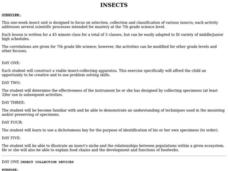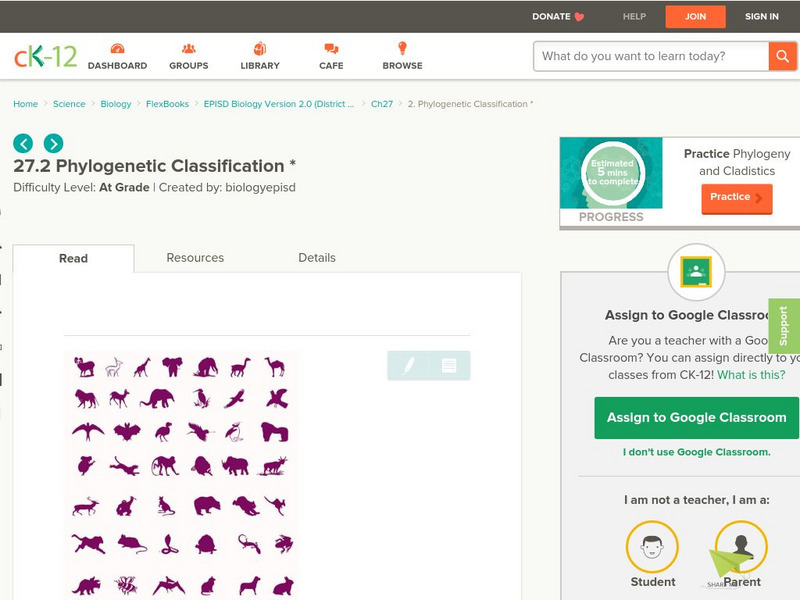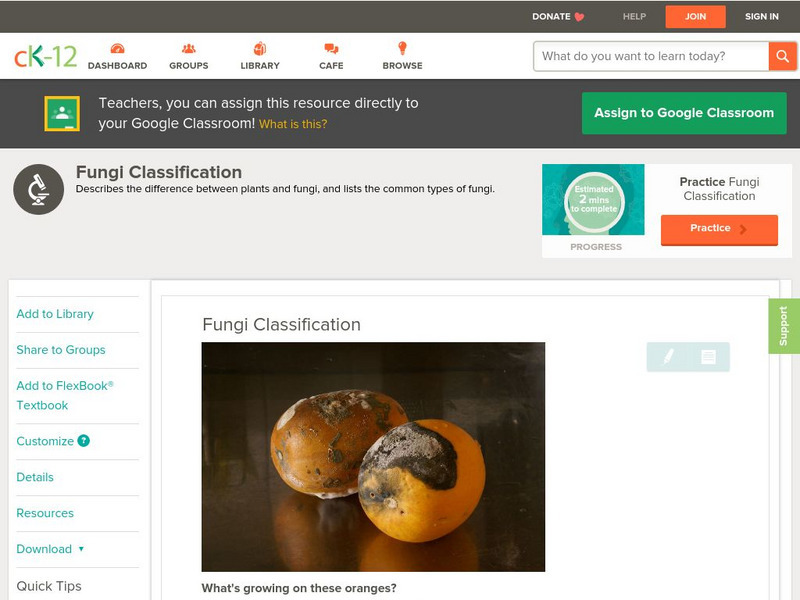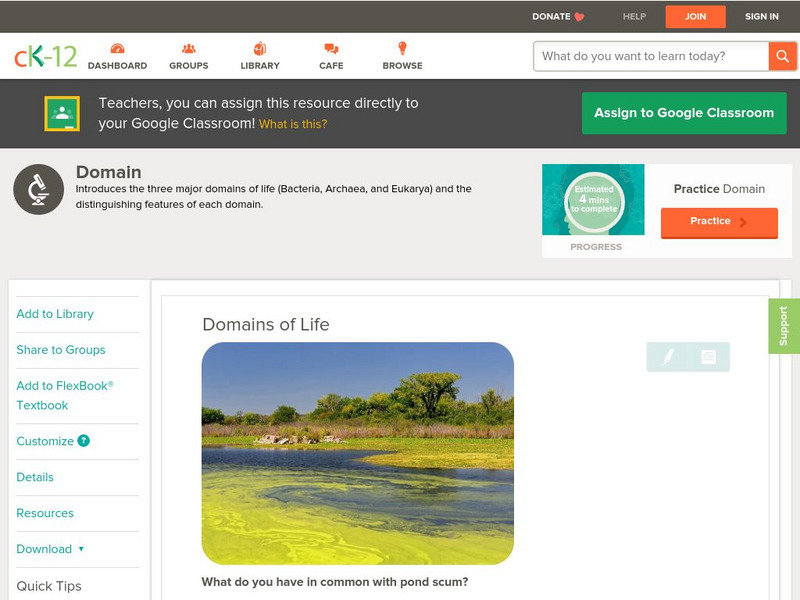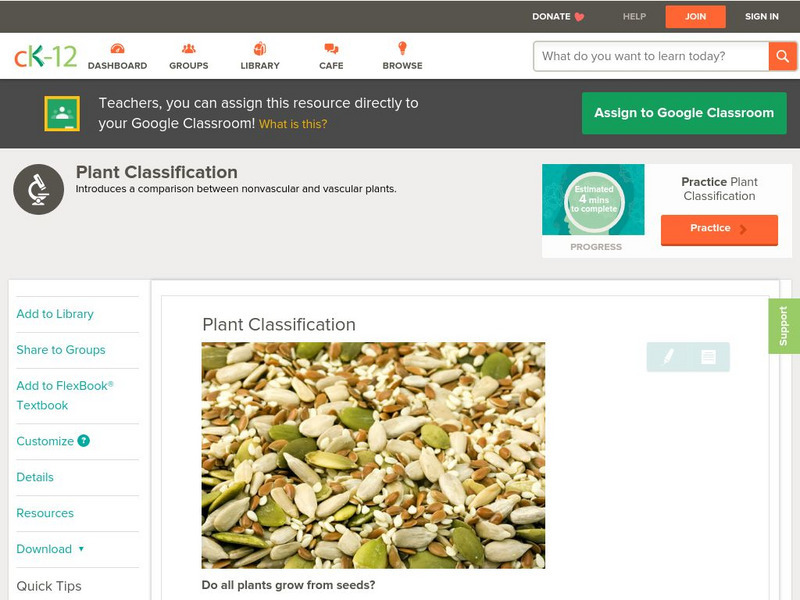Core Knowledge Foundation
Classification of Animals Tell It Again!™ Read-Aloud Anthology
Animal classification is the theme of a three-week read-aloud anthology. Scholars listen to and discuss a reading and complete extension activities throughout nine lessons. Writing opportunities delve deep into the process of writing an...
Curated OER
Ocean Life
Students explore the topics of ocean water salinity, ocean life zones, marine life classification, and ocean food chains. They observe demonstrations, conduct experiments, complete quizzes and handouts, and analyze key vocabulary.
Columbus City Schools
Get Your Organisms Organized
From large to small, show your class how to organize them all! Included within the guide is everything you need to take their knowledge of classification from the cellular to the species level. The worksheets focus on...
Curated OER
Everything in Its Place: Science Classification
Students investigate the system of classification for living things through the sixteen lessons of this unit. The five kingdoms of monerans, protists, fungi, plants, and animals form the basis of several experiments as the similarities...
Intel
Insects: The Good, The Bad, The Ugly
What would the world be like with no insects? Ponder this question using a research-based STEM unit that encourages scholars to investigate insects from both a beneficial and hazardous perspective. They learn about insect behaviors,...
New York City Department of Education
Myself and Others
Self reflection is an important skill to reinforce in our children, and it's especially helpful to help them realize who they are in the context of their environment. A collection of lessons about self image and community encourage...
Curated OER
Classy
Students explore the classification system in this seven lessons unit. The diversity of life forms and their characteristics are examined using a microscope. Kingdoms, classes, and families are investigated.
Lerner Publishing
Meet the Dinosaurs
Take your class of youngsters on a prehistoric adventure with this four-lesson series on dinosaurs. Accompanying the Meet the Dinosaurs books by Don Lessem, these lessons engage children in writing their own dinosaur books,...
Council for the Curriculum, Examinations and Assessment
Learning About Learning
Bloom's Taxonomy and Howard Gardner's Theory of Multiple Intelligences feature largely in a session that asks class members to identify their dominate learning style and intelligence. Furthermore, individuals consider how using...
Montana Natural History Center
Studying Grassland Ecosystems
At first glance, grassland ecosystems might seem dull and uninteresting, but once you start to explore it's amazing the things you'll find! Through this series of engaging lessons, activities, and experiments, elementary students examine...
Columbus City Schools
Sedimentary Rocks
Turn your class discussion of rock formation from ho-hum to holy hornfels! Junior geologists gain experience in identifying rock types and rock origins, with an emphasis in hypothesizing the environment needed to form certain...
Curated OER
Insects
Students construct a viable insect collecting apparatus. Students determine the effectiveness of the instrument he has designed by collecting specimens.
CK-12 Foundation
Ck 12: Episd: Phylogenetic Classification
[Free Registration/Login may be required to access all resource tools.] Identify the differences between Phylogenetic Classification and the Linnaean Classification systems. Recognize and know how to interpret a phylogenetic tree and a...
CK-12 Foundation
Ck 12: Episd: Linnaean Classification
[Free Registration/Login may be required to access all resource tools.] An introduction to the method of biological classification developed by Carl Linnaean.
Scholastic
Scholastic: Study Jams! Science: Plants: The Kingdoms of Life
A video, a karaoke song to sing along to, and a 7-question multiple-choice quiz on the topic of Kingdoms in the life classification system.
CK-12 Foundation
Ck 12: Life Science: Organization of Living Things
[Free Registration/Login may be required to access all resource tools.] When you see an organism that you have never seen before, you probably put it into a group without even thinking. If it is green and leafy, you probably call it a...
CK-12 Foundation
Ck 12: Life Science: Fungi Classification
[Free Registration/Login may be required to access all resource tools.] Scientists used to think that fungi were members of the plant kingdom. They thought this because fungi had several similarities to plants. However, there are a...
CK-12 Foundation
Ck 12: Life Science: Mammal Classification
[Free Registration/Login may be required to access all resource tools.] Traditionally, mammals were divided into groups based on their characteristics. Scientists took into consideration their anatomy, their habitats, and their feeding...
CK-12 Foundation
Ck 12: Life Science: Domains of Life
[Free Registration/Login may be required to access all resource tools.] Humans are in the same domain as trees and algae. What could they possibly have in common? It is the location of their DNA inside their cells. Their cells all have a...
E-learning for Kids
E Learning for Kids: Science: Easter Island: Why Do Young Grow Up to Look Like Their Parents?
Kevin and his grandfather, Omag are going to the zoo. Join them and learn all about animal classification and life cycles.
CK-12 Foundation
Ck 12: Life Science: Plant Classification
[Free Registration/Login may be required to access all resource tools.] Do all plants grow from seeds? No, there are actually a few plants that do not make seeds. Whether or not a plant makes seeds is one criteria used to classify...
Scholastic
Scholastic: Study Jams! Science: Animals: Kingdoms of Life
A playful interactive introducing biology's five animal kingdoms. Watch the video, take a quiz, and review vocabulary.
Georgia Department of Education
Ga Virtual Learning: Ap Biology: Diversity
An online course with interactive activities and learning exercises give students the opportunity to look at the tree of life and to determine how and why scientists believe each domain, species, and everything in between have such...
PBS
Pbs Learning Media: Dinosaur Train
Dinosaur Train sparks children's interest in life science and natural history. As they explore a variety of animals, children develop the inquiry skills and knowledge needed to help them think, talk and act like paleontologists. Choose...











